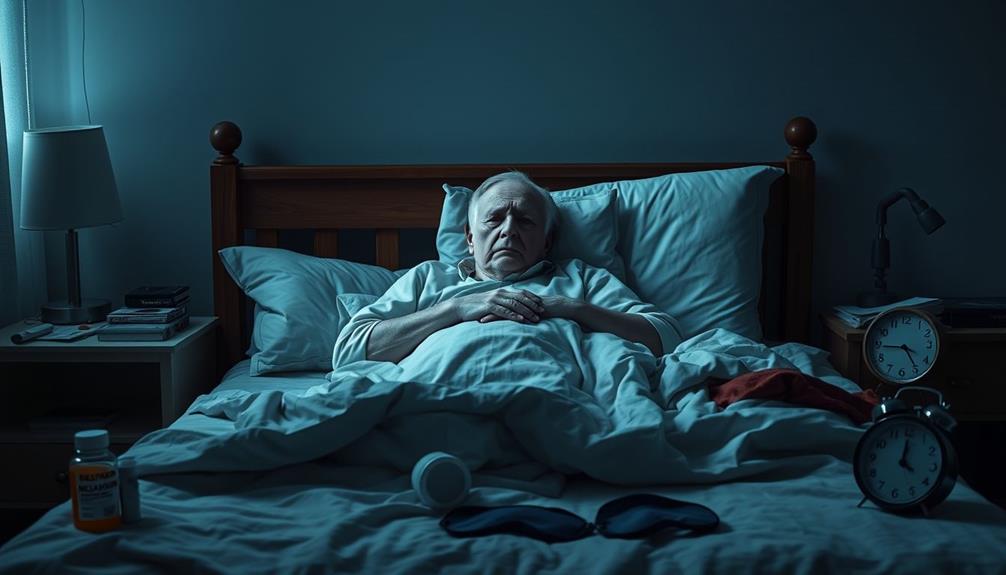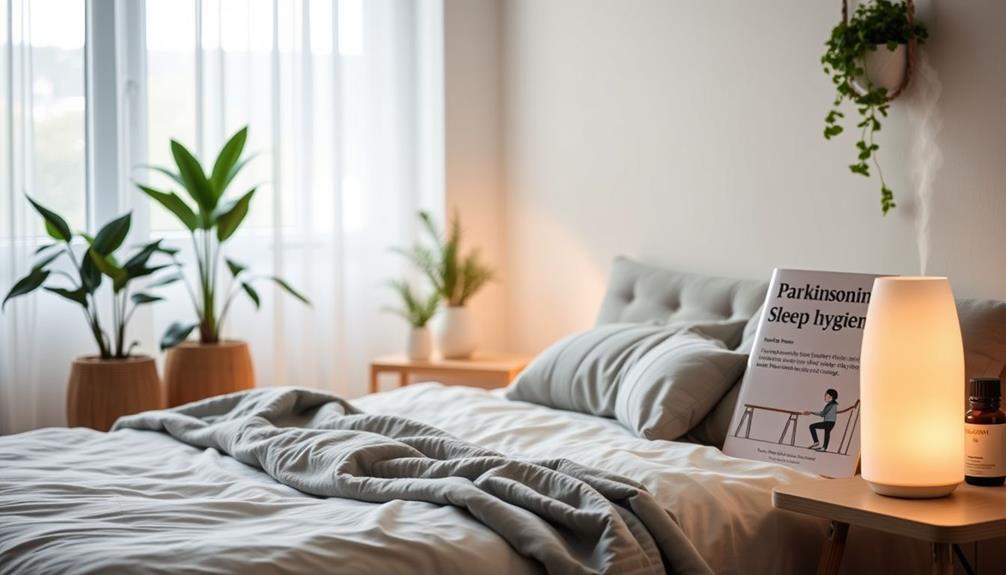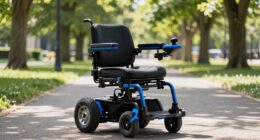Sleep problems are prevalent among individuals with Parkinson’s disease, affecting a significant percentage of patients. These issues may stem from brain degeneration, movement symptoms like tremors, and the side effects of medications. Common sleep disturbances include insomnia, REM sleep behavior disorder, and excessive daytime drowsiness, all of which can impact daily activities and safety, especially while driving. To address these concerns, treatment options such as dopaminergic medications and Cognitive Behavioral Therapy for Insomnia can be beneficial. Making lifestyle changes, such as sticking to a consistent sleep routine and creating a conducive sleep environment, can also make a difference. If you wish to explore effective strategies and additional resources, there is much more information available.
Key Takeaways
- Sleep disorders in Parkinson's patients, including insomnia and REM sleep behavior disorder, affect 50% to 98% of individuals, impacting daily life and safety.
- Neurodegeneration, motor symptoms, non-motor symptoms, and medication side effects contribute to sleep disturbances in Parkinson's patients.
- Diagnosis involves comprehensive medical history, sleep diaries, and possibly sleep studies to identify specific sleep disorders.
- Treatment combines pharmacologic approaches, like dopaminergic agents, with non-pharmacologic strategies such as Cognitive Behavioral Therapy for Insomnia (CBT-I).
- Lifestyle modifications, including consistent sleep schedules and a conducive sleep environment, can significantly enhance sleep quality and overall well-being.
Overview of Parkinson's Disease

Parkinson's disease is a progressive neurodegenerative disorder that primarily affects your movement. This condition occurs due to the loss of dopamine-producing neurons in your brain, leading to a variety of motor symptoms. You may experience tremors, stiffness, and bradykinesia, which can impact your daily activities.
However, Parkinson's disease isn't just about movement; it also comes with non-motor symptoms that can affect your emotional and mental well-being. Additionally, individuals with Parkinson's may experience various health issues, including cold medications overview that can complicate their treatment regimen.
Many individuals with Parkinson's experience sleep disturbances, which can greatly lower your quality of life. Approximately 50% to 81% of you may struggle with these issues, contributing to heightened risks of depression.
In fact, nearly 50% of those with Parkinson's may face depression, and this can further complicate your sleep problems. Early identification of these sleep disturbances is essential, as they may serve as early indicators of the disease.
Effective management of both motor and non-motor symptoms can help improve your overall well-being. By understanding the complexities of Parkinson's disease, you can actively participate in your treatment, leading to a better quality of life. This includes not only medication management but also incorporating lifestyle changes such as regular exercise, healthy eating, and maintaining a strong support system. Additionally, careful planning is essential when **traveling with Parkinson’s patient** to ensure comfort, safety, and access to necessary resources. By staying informed and proactive, you can better adapt to the challenges that Parkinson’s may present. Moreover, recognizing and addressing the emotional and psychological impacts of Parkinson’s disease can significantly contribute to a balanced approach to care. When planning trips, it’s helpful to incorporate **travel tips for Parkinson’s patients** to reduce stress and enhance the travel experience, such as ensuring medication is easily accessible and allowing for extra time at airports or rest stops. With the right preparations and a proactive mindset, both the patient and their caregivers can embrace a fulfilling life despite the challenges posed by the disease.
Sleep Problems in Parkinson's

If you have Parkinson's, you might notice that sleep problems can greatly disrupt your daily life.
Common issues like insomnia, REM sleep behavior disorder, and excessive daytime sleepiness can leave you feeling drained and affect your overall well-being.
Additionally, some patients may experience emotional dysregulation, which can exacerbate sleep disturbances, leading to a more complicated management process challenges with emotional regulation.
Understanding these disorders is essential for finding effective ways to improve your sleep quality and manage your symptoms.
Types of Sleep Disorders
In the context of Parkinson's disease, sleep disorders can greatly impact daily life. Up to 98% of individuals with Parkinson's experience some form of sleep dysfunction, highlighting the need for effective financial considerations for elderly care due to potential increased healthcare costs.
Insomnia is common, often manifesting as difficulty falling asleep and frequent awakenings. Factors like tremors, vivid dreams, and nocturia can exacerbate this, negatively affecting your overall sleep quality.
Another significant issue is REM sleep behavior disorder (RBD), which affects 25-50% of Parkinson's patients. This disorder involves the physical enactment of dreams and can serve as an early warning sign of Parkinson's disease.
You might also encounter excessive daytime sleepiness (EDS), affecting around one-third of patients. This can stem from neurodegeneration, medication effects, and irregular sleep-wake routines.
Moreover, obstructive sleep apnea is a concern, impacting up to 40% of individuals with Parkinson's. It leads to chronic sleep deprivation and increases the risk of cognitive impairment.
Recognizing these types of sleep disorders is essential for managing your condition effectively and improving your quality of life.
Impact on Daily Life
Many individuals with Parkinson's disease find that sleep disorders greatly disrupt their daily lives. Up to 98% of you may experience sleep dysfunction, which can considerably impact your overall quality of life. Incorporating gentle stretching before bedtime can help relax muscles and improve sleep quality.
Excessive daytime sleepiness affects 30-50% of you, leading to impaired safety in activities like driving and increasing the risk of accidents.
Insomnia often manifests as frequent nocturnal awakenings and difficulty falling back asleep, worsened by motor symptoms and medication side effects. Sleep-disordered breathing, including obstructive sleep apnea, is another concern, affecting up to 40% of individuals and contributing to chronic sleep deprivation and increased daytime fatigue.
Moreover, if you experience REM Sleep Behavior Disorder (RBD), you might physically enact your dreams, raising serious safety concerns and the potential for injury during sleep.
These issues not only disrupt your nights but also lead to considerable challenges during the day, affecting your ability to function effectively. Addressing sleep disorders is essential for enhancing your safety, well-being, and overall quality of life as you navigate the complexities of living with Parkinson's disease.
Common Sleep Disorders

When you're living with Parkinson's, you might face several common sleep disorders.
Insomnia, excessive daytime sleepiness, and REM Sleep Behavior Disorder (RBD) can greatly impact your quality of life.
These issues can be exacerbated by the challenges associated with managing Parkinson's symptoms, including mammography guidelines and their implications for overall health.
Understanding these issues is essential for managing your symptoms and improving your overall well-being.
Insomnia Challenges in Parkinson's
For those living with Parkinson's disease, insomnia can be a frustrating and persistent challenge. Studies reveal that 50% to 81% of patients experience sleep disturbances, often stemming from motor symptoms like tremors and rigidity, as well as mood disorders such as depression. These factors contribute to restless sleep and difficulty falling or staying asleep.
| Causes of Insomnia | Symptoms | Management Strategies |
|---|---|---|
| Motor symptoms | Difficulty falling asleep | Behavioral therapies |
| Mood disorders | Frequent awakenings | Lifestyle modifications |
| Medications | Daytime sleepiness | Medication adjustments |
Pain, mobility issues, and the side effects of medications, like vivid dreams, can further complicate your ability to achieve restful sleep. This insomnia can exacerbate daytime sleepiness, negatively impacting your overall quality of life and safety during daily activities.
To manage insomnia effectively, a thorough approach is essential. This includes behavioral therapies and lifestyle modifications tailored to your individual needs. By addressing these challenges head-on, you can work toward improving your sleep quality and overall well-being.
Excessive Daytime Sleepiness Issues
Excessive daytime sleepiness (EDS) can greatly disrupt daily life for those with Parkinson's disease. This condition affects about 30-50% of individuals, greatly impairing functioning and safety. EDS is closely tied to neurodegeneration and a decrease in alertness-related neurotransmitters. While dopaminergic medications can help manage motor symptoms, they might also worsen sleepiness.
Additionally, incorporating effective strategies for weight loss may help improve overall health and energy levels, which can be beneficial for managing EDS.
To better manage EDS, consider these key factors:
- Poorly controlled motor symptoms can exacerbate fatigue.
- Coexisting mood disorders, such as depression, affect nearly half of PD patients.
- Irregular sleep-wake routines can lead to pronounced sleepiness.
Sleep attacks, or sudden bouts of sleepiness, can occur, especially with dopamine agonists, increasing accident risks. Addressing EDS involves optimizing medication regimens and implementing behavioral modifications.
Focus on establishing consistent sleep-wake routines and managing motor symptoms to enhance your quality of life. By tackling the underlying causes of EDS, you can make considerable strides in improving your daily functioning and safety, allowing you to engage more fully in life despite the challenges of Parkinson's disease.
REM Sleep Behavior Disorder
REM Sleep Behavior Disorder (RBD) poses significant challenges for individuals with Parkinson's disease, affecting 25-50% of patients. You might experience vivid dreams, nightmares, or even episodes of yelling and thrashing during sleep, which can severely disrupt your sleep quality, as well as that of your partner.
RBD often acts as an early warning sign of Parkinson's disease, sometimes appearing years before any motor symptoms. Managing RBD symptoms with complementary approaches, such as using essential oils for relaxation, can be beneficial; for instance, calming effects of lavender oil may help improve sleep quality.
Management of RBD is vital for your safety and well-being. It typically involves creating a safe sleep environment by removing sharp objects from your bedroom and ensuring there's enough space to prevent injuries.
Additionally, medication can play a significant role in treatment. Medications like melatonin or clonazepam may help reduce the intensity of RBD symptoms.
It's essential to monitor RBD symptoms closely, as research shows a strong association between RBD and a higher risk of developing neurodegenerative diseases, particularly Parkinson's disease and Lewy body dementia.
Diagnosis of Sleep Disorders

Diagnosing sleep disorders in Parkinson's patients requires a thorough medical and sleep history to pinpoint specific sleep issues and their effects on daily life. This process often involves gathering detailed information about your sleep patterns and how they impact your daytime functioning.
Understanding the significance of a well-structured approach to managing finances can also parallel managing health, as both require careful planning and attention to detail. To aid in this diagnostic journey, you might be asked to:
- Keep a sleep diary to track your sleep schedule, disturbances, and daytime sleepiness.
- Discuss any nocturnal awakenings or other issues you've been experiencing.
- Evaluate coexisting mood disorders that could exacerbate your sleep problems.
Healthcare providers may also recommend sleep studies, like polysomnography, to diagnose specific conditions such as sleep apnea or REM Sleep Behavior Disorder (RBD). By evaluating your sleep history and conducting these studies, specialists in sleep medicine can better understand your unique situation.
This collaboration often leads to a tailored approach, ensuring that your specific sleep issues are addressed effectively. Remember, identifying the root causes of your sleep disorders is essential for improving your overall quality of life and managing symptoms associated with Parkinson's disease.
Additionally, maintaining a regular review of your health and budget can be beneficial in managing overall well-being, similar to establishing a personal budget.
Treatment Approaches

After identifying the specific sleep issues affecting Parkinson's patients, it's important to explore effective treatment approaches tailored to individual needs. Treatment approaches for sleep disorders in Parkinson's disease encompass both pharmacologic and non-pharmacologic strategies.
Cognitive Behavioral Therapy for Insomnia (CBT-I) is often recommended as a first-line treatment, effectively reducing sleep latency and improving overall sleep quality. Additionally, implementing routine lifestyle changes and dietary adjustments, such as consuming foods rich in antioxidants, may support overall health and potentially aid in sleep quality beneficial for overall health.
When considering pharmacologic strategies, dopaminergic agents can yield mixed results. While some may enhance sleep quality, others might exacerbate sleep issues, so careful monitoring and adjustments are essential.
Non-pharmacologic strategies like bright light therapy have also shown promise, helping to improve sleep quality and daytime alertness without invasive measures.
A thorough management plan is vital, as sleep disturbances in Parkinson's disease are multifaceted, influenced by motor symptoms, mood disorders, and medication effects. By addressing these factors, you can find the most suitable treatment approach to enhance your sleep quality.
Lifestyle Modifications

Making lifestyle modifications can greatly improve sleep quality for individuals with Parkinson's disease. By adopting certain habits, you can markedly reduce sleep disturbances and enhance your overall well-being.
Engaging in regular physical activity not only fosters emotional resilience but also helps enhance sleep quality, as discussed in the power of imagination. Here are a few key strategies to reflect upon:
- Maintain a consistent sleep schedule by going to bed and waking up at the same time every day. This helps regulate your sleep patterns and improves your sleep hygiene.
- Engage in regular physical activity, like daily walking or yoga, to enhance sleep quality and reduce sleep latency. Aim for at least 30 minutes of moderate exercise most days.
- Create a sleep-conducive environment; keep your bedroom cool, dark, and quiet. Reserve this space solely for sleep and intimacy to reinforce positive sleep associations.
Additionally, limit your liquid intake in the evening to reduce nocturia, and avoid stimulants like caffeine and nicotine, as well as heavy meals close to bedtime.
Alternative Therapies

In addition to lifestyle modifications, exploring alternative therapies can play a significant role in improving sleep for individuals with Parkinson's disease. One effective method is Cognitive Behavioral Therapy for Insomnia (CBT-I), which addresses dysfunctional thoughts and behaviors related to sleep, ultimately reducing sleep latency and enhancing overall sleep quality.
Incorporating regular physical exercise into your routine can also yield benefits. Studies suggest that engaging in consistent physical activity helps improve sleep quality and decrease sleep latency, making it a crucial component of managing sleep disorders in Parkinson's patients.
Another promising option is bright light therapy, which has shown significant improvements in sleep quality, mood, and even motor function in those with Parkinson's. This non-pharmacologic approach can act as a valuable therapeutic intervention.
Additionally, practicing relaxation techniques like deep breathing and meditation can alleviate sleep disturbances by reducing anxiety and fostering a calming bedtime routine.
These non-pharmacologic approaches, including light therapy and exercise, are increasingly recognized as fundamental in treatment plans, complementing pharmacologic options and addressing the unique sleep challenges faced by individuals with Parkinson's disease.
Resources for Support

Finding support is essential for managing sleep disorders associated with Parkinson's disease. By reaching out to various resources, you can better navigate the challenges of your condition and improve your overall well-being. Here are some valuable options to contemplate:
- Support groups: Connecting with others facing similar challenges can provide emotional support and practical coping strategies.
- Educational resources: Non-profit organizations offer information on treatment options and symptom management, particularly for sleep disturbances.
- Professional organizations: Groups like the Parkinson's Foundation provide research updates and local resources tailored to your needs.
Don't hesitate to consult your healthcare provider for personalized advice on managing sleep disorders. They can help identify effective treatment options and recommend community resources.
Additionally, online platforms and helplines can connect you with professionals who specialize in Parkinson's disease. These resources can offer guidance on medication adjustments and lifestyle changes that may enhance your sleep quality.
Frequently Asked Questions
What Causes Sleep Problems in Parkinson's Disease?
In Parkinson's disease, motor symptoms like tremors disrupt your sleep. Neurodegeneration affects alertness, while mood disorders and frequent nighttime urination further complicate rest. These factors collectively lead to significant sleep issues you might experience.
What Can Parkinson's Patients Take to Help Them Sleep?
Imagine drifting into a peaceful slumber. You can explore options like Cognitive Behavioral Therapy for Insomnia, melatonin, or even light therapy. Each choice can enhance your sleep quality without the side effects of medications.
What Position Should Parkinson's Sleep In?
You should try sleeping on your side to enhance comfort and reduce breathing issues. Elevating your head may also help. Finding a position that minimizes stiffness and promotes relaxation is essential for better sleep quality.
How Much Melatonin Should a Parkinson's Patient Take?
You should consider starting with a low dose of melatonin, around 0.5 mg, and see how it affects your sleep. Always consult your healthcare provider before adjusting your dosage or starting any new supplements.
Conclusion
In summary, managing sleep disorders in Parkinson's patients is essential for improving overall quality of life. For instance, consider John, a 68-year-old diagnosed with Parkinson's who struggled with insomnia and vivid dreams. After working with his healthcare team, he adopted lifestyle changes and explored alternative therapies, leading to better sleep and daytime alertness. By addressing sleep issues proactively, you can help enhance both your well-being and that of loved ones facing similar challenges.









